I’ve written a lot about mortgage repayment, on my blog and elsewhere, for two reasons. First, the mortgage is the largest monthly expense that many families have. Second, there are a lot of myths about mortgages and real estate out there.
When we got our mortgage, interest rates were around 8%. We refinanced a few times as rates fell (and they fell hard back in the day.) We made sure we could make our mortgage payment on one income, given the vagaries of self-employment and the modern economy, and then we finally paid the mortgage off before we had to start paying college tuition so that our monthly expenses stayed stable.
That’s our situation. Yours may be very different, so here are a few questions to help you decide what to do:
1. Are you receiving a tax deduction? Although everyone assumes that they are getting a tax deduction from their mortgage, most people aren’t. If you have a small mortgage or have had it for a long time, the amount of interest in each payment is likely to be small, and only the interest is deductible. Did you itemize your last tax return? If not, you don’t pay enough interest to receive a deduction. Now that the standard deduction is $13,850 for single filers and $27,700 for married couples, you probably didn’t itemize.
2. What is your interest rate before and after the tax deduction? If you are not receiving a mortgage interest deduction, your effective interest rate is the same as the rate on your mortgage. If you can deduct the mortgage, then your after-tax rate is lower. To find it, multiply your mortgage interest rate by 1 minus your marginal tax rate. This is the highest rate you pay, and you can find what it will be for 2023 here.
If you are a married couple filing jointly with an income between $89,450 to $190,750, the table shows that your marginal tax rate (the rate you pay on an additional dollar of income) is 22%. If your mortgage interest rate is 8%, then your after-tax cost is 8% X (1-.22) = 6.24%.
3. What else would you do with the money? In finance, people talk about opportunity cost, which is what else you would do with the money. This is where knowing your interest rate comes in handy. If the after-tax interest rate on your mortgage is 6.24% and you have credit card debt at 22% interest, then you should put extra money toward the credit card. If the interest rate on your mortgage is 6.24% and you can get a bank CD for 10% (and there have been times when you could get CDs at that rate), put the money in the CD. If you have very little in your retirement account, you should contribute to that instead of paying off the mortgage. If you have no other debt, are in good shape on retirement, and can’t find a low-risk investment that returns more than you pay on your mortgage, then pay off the house.
4. How regular is your income? With a mortgage, you have an obligation to pay every month until the mortgage is paid off. If you make a prepayment, you will reduce the time it takes to repay the mortgage, but you won’t be able to get out of any monthly payments until then. If you aren’t sure that you can make the monthly payments easily (for example, there are rumors of layoffs circulating at work), put your extra money into an emergency fund – unless you have enough extra money to pay off the mortgage entirely.
On the other hand, if you bought your house 10 years ago when you made less much money, and now you have a nice, consistent, high income with plenty of money saved, you’re probably safe paying ahead on the mortgage.
5. How close are you to retirement? Owning the place where you live is a boon in retirement; it reduces the amount of money you need to live well. If you must pay your mortgage, you’ll need enough retirement income to do that. That’s tough for many people. The closer you are to retirement, the more you should concentrate on paying off your house. Once it’s paid off, put the money that would have gone to the house payment into a retirement account.
If your mortgage payment is so high that you can’t save for retirement, consider selling your house and moving to cheaper digs.
A mortgage is not a bad thing, not at all, if you can afford the payments! However, many people over-value the tax deduction and end up paying the bank more money than they need to. As with so many financial issues, the right answer will be different for different people at different times, but this should give you some ideas.
Got any burning financial questions? Let me know.





